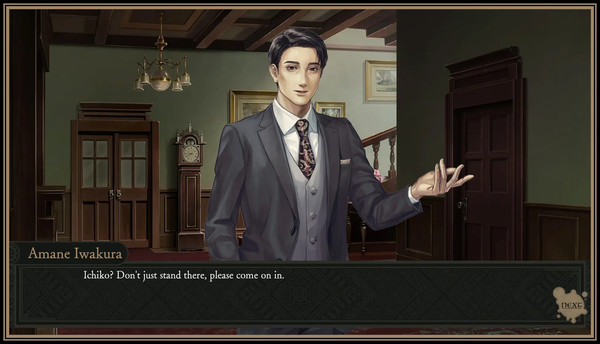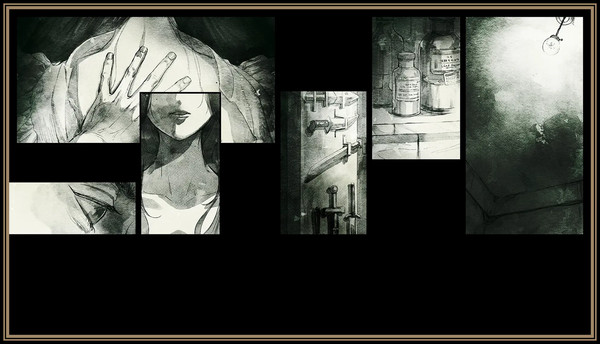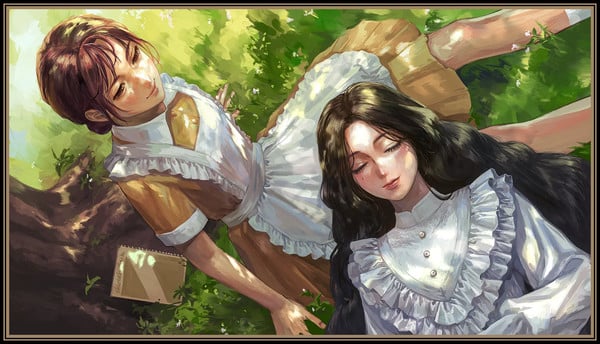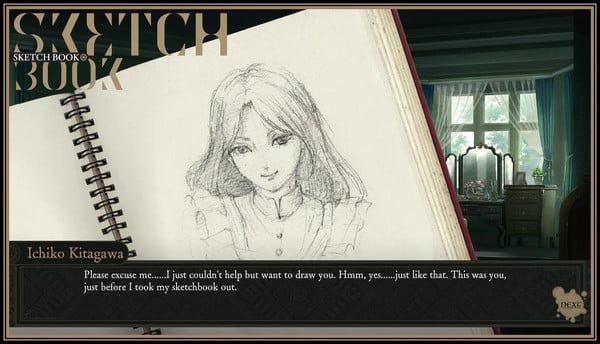Game Review
by Rebecca Silverman,Iwakura Aria Game Review
Nintendo Switch
| Description: |  |
||
In 1966, Ichiko is struggling to survive as an orphan with no real prospects. She's back in the orphanage that raised her after a failed job when she meets a mysterious, handsome man named Amane Iwakura. Amane admires a painting she's done and tells her that he has a daughter her age, then offers her a job as a live-in maid at his home. Ecstatic, Ichiko agrees, but she hasn't been at the mansion very long before she begins to notice that nothing is quite as it seems. |
|||
| Review: | |||
We tend to view the past in either a rosy light or a gently-tinted sepia one. Yes, bad things happened long ago, but it was still a simpler time – no internet, no constant assault by phones, just a world that seems not quite real, if not better. Iwakura Aria, an original visual novel from MAGES, absolutely understands that. Set in 1966, a time far enough in the distance that we may not regularly interact with people who lived it, but still within the memories of a decent portion of the population. That makes it hazy, a feeling that the story capitalizes on.  © MAGES The plot follows sixteen-year-old Ichiko Kitagawa. An orphan, she's grown up in a combination of foster homes and orphanages, and now that her compulsory schooling is done, she needs to enter the workforce. That hasn't proved easy, and when we first meet her, she's at a flea market, selling items to benefit the orphanage that has taken her back in despite her advanced age. Among the things for sale is a painting she did, and that's what catches the eye of a well-dressed man named Amane Iwakura. He buys her painting and makes her an unbelievable offer: to come to his mansion as a live-in maid. He has, he says, a daughter her age who loves art, and he'd like Ichiko to interact with her. Ichiko is thrilled and accepts, but when she arrives at the mansion, it soon becomes clear that not everything is what it seems.  © MAGES The greatest strength of this game is the way that nothing is ever wasted. This applies to background details, tiny character interactions, and nearly every major conversation that occurs. This enables the story to create a deeply realized world without overwhelming the player, and it contributes to the overall plot progression, which, rather than being “twisty,” I'd say that it instead drops revelations like breadcrumbs, occasionally leaving an entire loaf in the path. That gives the story a sense of uncertainty, because you're never sure which revelation is going to be the last or where the story is going to go once something is revealed. The surprises always feel like shocks, but none of them come out of the blue, and everything builds to create a story that makes sense, even if you never suspected that things were heading in a given direction.  © MAGES There are only three main characters, although an argument could be made for Sui, the cook, as well. Ichiko is the primary protagonist, and most of the game is seen through her eyes. We get moments from both Amane and his daughter Aria's points of view, as well, which help to seed clues and to let us know how much Ichiko is missing. Many of these are done with black and white art (with bright splashes of red) that form a striking contrast to the rest of the artwork, which is full color and moderately realistic. (Faces, particularly Aria's, can be a bit uncanny, but that works with the plot.) Aria is the character we hear the least from, which makes perfect sense: although the game is named after her, she's more an object of worship, affection, or attraction for those around her. Aria, as a person, isn't necessarily someone who's allowed to exist.  © MAGES As a visual novel, gameplay is fairly simple. Most of the game consists of reading and advancing the text; dialogue choices come up at times without much rhyme or reason, although the points always do turn out to be important later on and lead to one of nine possible endings of varying subjective goodness. There are also sections where Ichiko explores or cleans the mansion, which require the player to choose which room(s) to enter. Rooms with plot-progressing information are marked in red, but there's something to be learned in each one of them, and I'd encourage you to visit each room twice. (More than that doesn't change the dialogue.) The game has a solid autosave feature that does, eventually, write over earlier saves, but there's also a manual save accessed through the + button on the Switch. This took me longer than I care to admit to figure out, because upon first loading the game, it just jumps right in, and the manual must be accessed from the menu, which requires the + button rather than the Y, as I was used to. The game is fully and well-voiced, and the music is the right kind of haunting – almost in the background until you realize what you're hearing, which I found very effective.  © MAGES Iwakura Aria isn't a gentle or a sweet game. It trades in questions of love and pain, and whether or not the characters can separate those two things – or if they want to. There is a lesbian love story running through, but it's a dark one, and players should be aware going in that this game deals with cults, violence, self-harm, and near-murder. There's a fair amount of gory imagery, too, although I'd hesitate to truly call it explicit. Still, it's not a game for the faint of heart or stomach. In the dictionary, an aria is an accompanied solo song in an operatic setting. Although the game is named for Aria the person, the definition of the word also fits – whether you see Ichiko or Aria as the singer, with the other as the accompanist, it is the two of them together who create the aria of the Iwakura manor. The story never loses sight of this, and its side stories, unlocked at various points in the main storyline, help to support it. If you're a fan of The House in Fata Morgana or The Dark Maidens, this is a game you'll want to play. |
| Grade: | |||
|
Overall : A-
Graphics : A-
Sound/Music : B+
Gameplay : B+
Presentation : A
+ Beautiful, slightly uncanny art, storytelling lets nothing go to waste. ⚠ Gore, predation, implied sexual abuse |
|||
| discuss this in the forum | | |||